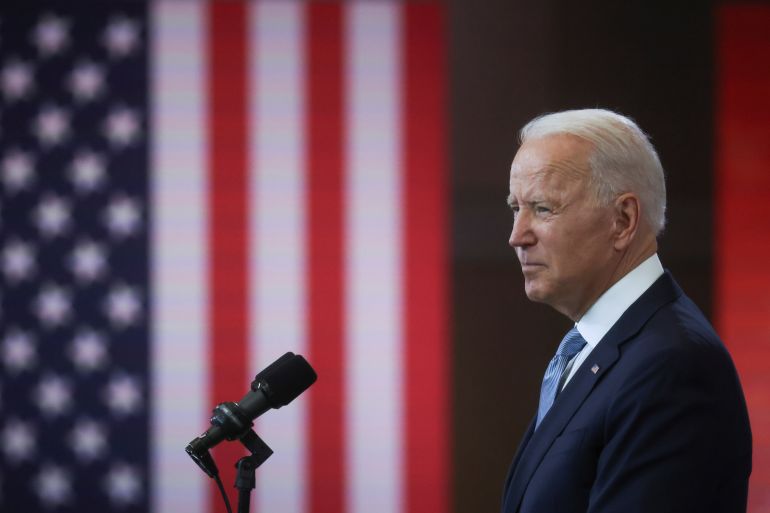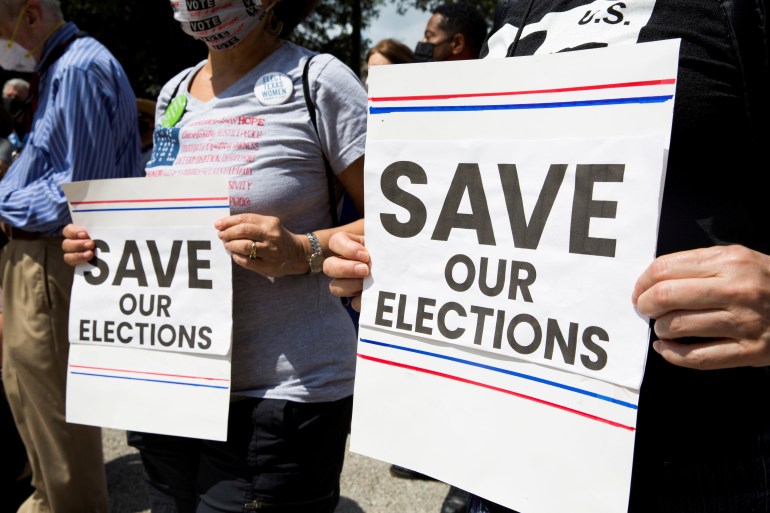Biden slams Republican state voting bills as ‘un-American’
Texas legislators go to Washington and call on US President Joe Biden and Congress to counter state voting restrictions.

US President Joe Biden on Tuesday launched his strongest counter attack yet against his predecessor Donald Trump’s false claims the 2020 election was stolen, as moves by Republicans to limit voting access gain momentum across the United States.
“In America, if you lose, you accept the results, and follow the Constitution. You try again. You don’t call facts ‘fake’ and then try to bring down the American experiment just because you’re unhappy,” Biden said on Tuesday, without directly naming the former president.
Keep reading
list of 4 itemsUS Justice Dept sues Georgia over restrictive state voting law
US Senate Republicans block Biden-backed voting reforms
US Democrats face crucial test on voting reform
“That’s not statesmanship. That’s selfishness. That’s not democracy. It’s the denial of the right to vote. It suppresses and subjugates.”
Invoking the US civil rights movement of the 1960s and the historic battle for Black liberation that began after slavery, Biden delivered a fiery speech in Philadelphia condemning the drive by Republicans in several US states including Texas, Georgia, Iowa and Pennsylvania to enact new restrictions on voting following Trump’s defeat.
The attempts to put in place state-level voting restrictions are widely seen as discriminatory.
“There is an unfolding assault taking place in America today, an attempt to suppress and subvert the right to vote, and fair and free elections,” Biden said. “We’re facing the most significant test of our democracy since the Civil War. That’s not hyperbole.
“The denial of free and fair elections is the most un-American thing that any of us can imagine,” he also said.
At the national level, Democrats are blocked from passing a voting rights bill in the US Senate, which is evenly divided 50-50 between Democrats and Republicans and has rules requiring 60 votes to pass new laws.
But Biden, who spoke on Tuesday at the site of Constitution Hall in Philadelphia where the US Constitution was written in 1787, called on Congress to pass the John Lewis Voting Rights Advancement Act, which would protect voting rights.
The bill, drafted by the Congressional Black Caucus, is headed for passage in the US House of Representatives this year but faces an uphill battle with Republicans in the US Senate.
Al Jazeera’s Kimberly Halkett, reporting from Philadelphia, said Biden has said protecting voting rights will be “a priority of his presidency”.
“That’s why he says he’s tasking his vice president, Kamala Harris, to oversee and protect ballot access, to make sure that that is something that is entrenched as part of American democracy for generations to come,” Halkett said.

Texas fight
Meanwhile, Texas Democrats paralysed the state legislature on Tuesday as Republicans sought to pass new legislation that would tighten voting rules in the state, part of a nationwide wave of Republican bills to restrict voting at the state level.
“Texas Republicans have failed Texas. Texas Republicans don’t want free and fair elections,” Texas state House Representative Toni Rose, a leader of the Texas House Democratic Caucus, told a news conference at the US Capitol in Washington, DC.
“House Bill 3 puts deliberate barriers to voting, to make it harder for Texans to cast just a free, safe, and equal vote. House Bill 3 is an attack on voters’ freedoms, and democracy,” Rose said.
The Republican bill in Texas would make it possible for “partisan poll watchers to harass and intimidate voters”, Rose said.
More than 50 Texas Democratic legislators flew on two chartered planes from Texas to Dulles International Airport outside Washington, DC on the night of July 12.
The rare move prevents Texas Republicans from attaining the necessary quorum of 100 state House lawmakers present at the state capitol in Austin, Texas, to hold votes on legislation.
Texas Republicans planned to advance the bill – which they argue is designed to improve the integrity of the elections, not limit people’s right to vote – through the state Senate as soon as Tuesday. The bill includes new identification requirements for voting by mail and a ban on 24-hour polling locations and drive-through voting.
Elsewhere, Republicans in 17 states have enacted new rules rolling back voting hours and polling locations – and tightening ID requirements, among other changes to local procedures – following former President Trump’s defeat in the record-turnout 2020 election.
Texas Governor Greg Abbott warned that the Texas Democratic legislators faced arrest and he vowed to continue to call special sessions of the Texas legislature as needed to get the bill passed.
“If they do not return to work, they are risking losing their jobs as state representatives for not showing up,” Abbott said in an interview with KVUE, an Austin television news station.
“If these people want to be hanging out wherever they’re hanging out on this taxpayer-paid junket, they’re going to have to be prepared to do it for well over a year,” Abbott said. “As soon as they come back in the state of Texas, they will be arrested, they will be cabined inside the Texas Capitol until they get their job done.”
Texas Democrats say the legislative process in Austin was “poisoned” by Republican partisan moves beginning in May to ram the legislation through without Democratic input or adequate public transparency.
“We are not going to buckle to the big lie in Texas, the big lie that has resulted in anti-democratic legislation throughout the United States,” said Texas Representative Rafael Anchia, a leader of the Texas House Democratic Caucus.
“We are happy to vote on bipartisan proposals that expand the right to vote, that make it easier to vote and harder to cheat in the state of Texas, but that is not what we saw at the outset of this process,” Anchia said.
The US Supreme Court ruled in July that two Republican-backed voting rules in Arizona that opponents had argued disproportionately burdened Black, Latino and Native American voters could stand. That precedent could make court challenges to other voting restrictions difficult.